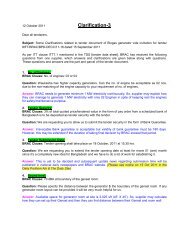Combining health and social protection measures to reach the ultra ...
Combining health and social protection measures to reach the ultra ...
Combining health and social protection measures to reach the ultra ...
- No tags were found...
Create successful ePaper yourself
Turn your PDF publications into a flip-book with our unique Google optimized e-Paper software.
Access <strong>to</strong> <strong>health</strong>Open access <strong>to</strong> research pro<strong>to</strong>cols<strong>and</strong> results: intellectual property<strong>and</strong> <strong>the</strong> right <strong>to</strong> <strong>health</strong>Article by Rodrigo A SalinasThe human right <strong>to</strong> <strong>the</strong> highest attainable st<strong>and</strong>ard of<strong>health</strong> requires for its fulfilment access <strong>to</strong> good quality<strong>health</strong> care. Equitable access <strong>to</strong> <strong>health</strong> technologies,ranging from <strong>health</strong> promotion activities <strong>to</strong> drugs <strong>and</strong> complexinterventions, is a key part of <strong>the</strong> care provided. An equallyimportant requirement for ensuring good quality care,however, is access <strong>to</strong> information on <strong>the</strong> efficacy <strong>and</strong> safetyof <strong>the</strong>se technologies, coming from scientific research. Anybarrier hampering access <strong>to</strong> this information should beconsidered as dangerous as those barriers preventing access<strong>to</strong> drugs <strong>and</strong> o<strong>the</strong>r <strong>health</strong> technologies. The Doha Declarationrecognized in 2001 that trade-related intellectual propertyrights should not conflict with <strong>the</strong> right <strong>to</strong> protect public<strong>health</strong>. Conflict among <strong>the</strong>se rights, however, affects not onlyaccess <strong>to</strong> drugs, as emphasized by those mechanismscreated <strong>to</strong> implement <strong>the</strong> Declaration, but also access <strong>to</strong> <strong>the</strong>information on <strong>the</strong> efficacy <strong>and</strong> safety of <strong>the</strong>se drugs,particularly by those provisions contained in article 39.3 of<strong>the</strong> Trade-Related Aspects of Intellectual Property Rights(TRIPS) Agreement that reward <strong>the</strong> non-disclosure of <strong>the</strong>findings of medical research.The right <strong>to</strong> <strong>the</strong> highest attainable st<strong>and</strong>ard of <strong>health</strong> hasbeen recognized as a human right in <strong>the</strong> InternationalCovenant on Economic, Social <strong>and</strong> Cultural Rights, adopted<strong>and</strong> opened for signature <strong>and</strong> ratification by <strong>the</strong> GeneralAssembly of <strong>the</strong> United Nations (UN) in December 1966. Ina general comment issued by <strong>the</strong> Economic <strong>and</strong> SocialCouncil of <strong>the</strong> UN in 2000, it is explicitly stated that asubstantive issue arising in <strong>the</strong> implementation of this right is<strong>the</strong> provision of equal <strong>and</strong> timely access <strong>to</strong> basic preventive,curative, rehabilitative <strong>health</strong> services, regular screeningprogrammes <strong>and</strong> appropriate treatment of prevalent diseases<strong>and</strong> disabilities.The new global deal on intellectual property rights, arisingout of <strong>the</strong> Uruguay Round of Multilateral Trade Negotiationsthat concluded with <strong>the</strong> signature of <strong>the</strong> Agreement on TRIPS,<strong>and</strong> <strong>the</strong> creation of <strong>the</strong> World Trade Organization (WTO), in<strong>the</strong> eighties, has been denounced in many forums as a barrierfor fulfilling this right. The current system of granting patentsfor new drugs, considered as crucial for encouraging <strong>the</strong>invention of much-needed medicines by <strong>the</strong> pharmaceuticalindustry, has been considered as an obstacle for gettingequitable access <strong>to</strong> drugs in developing countries 1 . Theseconcerns <strong>and</strong> a couple of much publicized cases, such as <strong>the</strong>case brought against President Nelson M<strong>and</strong>ela by <strong>the</strong> SouthAfrican Pharmaceutical Manufacturers Association,eventually led <strong>the</strong> WTO <strong>to</strong> produce <strong>the</strong> Doha Declaration on<strong>the</strong> TRIPS Agreement <strong>and</strong> Public Health recognizing that:“…<strong>the</strong> Agreement can <strong>and</strong> should be interpreted <strong>and</strong>implemented in a manner supportive of WTO members’ right<strong>to</strong> protect public <strong>health</strong> <strong>and</strong>, in particular, <strong>to</strong> promote access<strong>to</strong> medicines for all” 2 .Ensuring access <strong>to</strong> drugs, notwithst<strong>and</strong>ing, is only oneamong o<strong>the</strong>r requirements needed for fulfilling <strong>the</strong> right <strong>to</strong>good quality <strong>health</strong> care. A much less explored, but equallyimportant domain is <strong>the</strong> need for ensuring access <strong>to</strong>information on <strong>the</strong> efficacy <strong>and</strong> safety of drugs. Health care,in order <strong>to</strong> achieve <strong>the</strong> desirable outcomes it is supposed <strong>to</strong>get, needs not only careful use of technologies that areapplied by <strong>health</strong> professionals, <strong>and</strong> provided by <strong>health</strong>services, but needs also a responsible <strong>and</strong> accountabledecision-making process leading <strong>to</strong> <strong>the</strong> prescription of aparticular procedure for a particular person. This decisionmakingprocess, <strong>to</strong> be considered a high quality one, needstimely access <strong>to</strong> adequate <strong>and</strong> appropriate information on <strong>the</strong>safety, efficacy <strong>and</strong> effectiveness of <strong>the</strong> whole menu oftechnologies that are available <strong>to</strong> be prescribed for differentconditions. Good quality information on <strong>the</strong>se domainscomes, in medicine, from methodologically sound <strong>and</strong>ethically responsible research. It is reasonable, thus, <strong>to</strong>conclude, that <strong>the</strong> materialization of access <strong>to</strong> <strong>health</strong> care asa human right, needs not only actual access <strong>to</strong> technologiesbut also adequate <strong>and</strong> timely access <strong>to</strong> information on thosedomains that allow appropriate decisions <strong>to</strong> be made at <strong>the</strong>points where <strong>the</strong>se decisions occur.Practising medicine <strong>and</strong> allied <strong>health</strong> professions in <strong>the</strong>21st century, would be unthinkable without access <strong>to</strong> goodquality data on <strong>the</strong> efficacy, effectiveness, <strong>and</strong> safety of <strong>health</strong>technologies, ranging from <strong>health</strong> promotion activities <strong>to</strong>highly sophisticated medical devices. As part of this move<strong>to</strong>wards explicit use of scientific data, evidence-basedmedicine has been widely accepted as a new paradigm forteaching <strong>and</strong> practising medicine, de-emphasizing intuition,unsystematic clinical experience <strong>and</strong> pathophysiologicrationale as sufficient grounds for decision-making 3 , <strong>and</strong>Global Forum Update on Research for Health Volume 4 ✜ 047



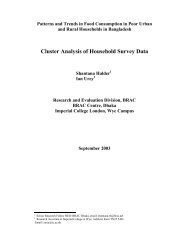
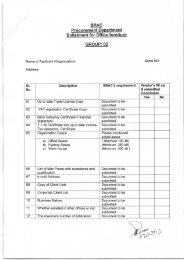
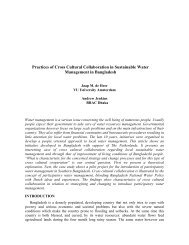
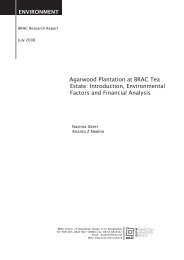
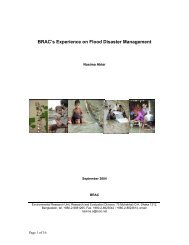
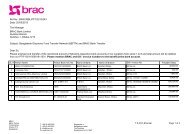
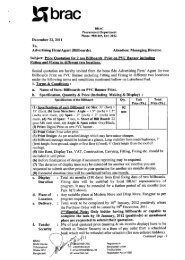
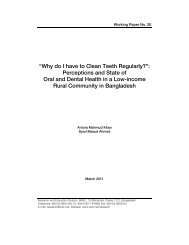
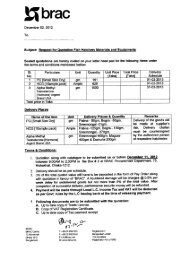

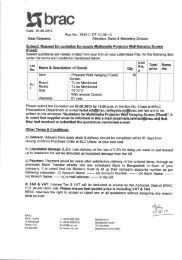
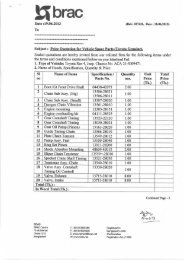
![[re-tender] RFQ for supply of Diesel Generator - Brac](https://img.yumpu.com/44421374/1/186x260/re-tender-rfq-for-supply-of-diesel-generator-brac.jpg?quality=85)
